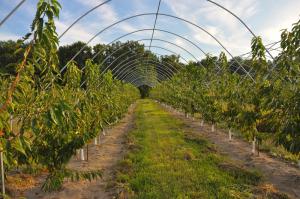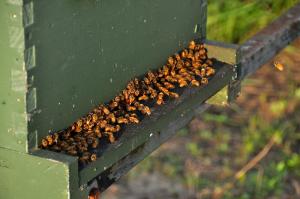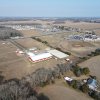Research and experiments on a farm near Bridgeville could have far-reaching effects on the future of fruit production in the state.
T.S. Smith & Sons, a fourth-generation farm known for its apples and peaches, is testing fruit varieties not typically grown on Delmarva: cherries, figs, quince, pomegranates, pears, paw paws and three-season strawberries.
Sussex County farmers and cooperative extension staff toured the farm Aug. 21, led by Charlie Smith, owner and grower, and Gordon Johnson, University of Delaware Cooperative Extension fruit and vegetable specialist.
Smith said the goal of the project is to offer local farmers options to expand their markets and at the same time establish a broader market for local fruit.
The farm has combined its own resources with a USDA Specialty Block Grant from the U.S. Farm Bill in collaboration with the University of Delaware and the Delaware Department of Education for a multiyear study on alternative fruits.
Strawberries and cherries
Smith's first crop of California strawberries produced 2,000 pounds of fruit this past June. Johnson said he hopes farmers will be able to grow strawberries from April to early December, far past the traditional mid-June time local berries are available. That will take a lot of work because the 6-acre field will need to be covered once the temperature is consistently in the 84-86 degree range, Johnson said.
Next summer, they plan to experiment with four colors of shade mesh for the plastic-culture strawberries. Johnson thinks traditional white mesh will probably turn out best suited, but red, silver and gray will also be tried. During the farm tour, Johnson demonstrated the ease of putting the innovative frame and mesh system together to allow for easy access for picking.
Johnson said the disease-resistant Albion and San Andreas strawberries are well suited to California conditions, and time will tell how they fare in Sussex County. Johnson said they are working on a variety specifically for the southern Delaware area.
“Our customers loved the idea of getting local strawberries out of season,” Smith said.
Smith has also invested resources and time to grow an orchard of cherry trees; he expects the first crop next spring.
Considered a specialty of the Pacific Northwest and Michigan, cherries are not grown in many other places in the country, especially not in humid areas like Delaware. However, that doesn't deter Smith's enthusiasm to grow several varieties of cherries on his farm. He plans to pollinate the trees using bees early next spring.
Once again, it will not come without a lot of labor. Because cherries will crack when exposed to rain and humidity – not to mention that birds love them – Smith has built metal tunnels covered with plastic and netting to keep out excess moisture and birds.
Smith is also using a system of weights, poles and plastic wiring to spread the branches of his two-year-old dwarf cherry trees. He will also do intensive pruning of the trees after the first fruit-bearing season.
Johnson and Smith said there is also a potential market for figs in southern Delaware.
The farm has eight varieties of figs planted amid the farm's apple orchards. “Fresh figs is the way to go; even California is transferring to fresh figs,” Johnson said. “They have to be harvested very carefully; we are researching post-harvest methods.”
Smith is also constantly growing new and improved apple varieties.
If climate conditions are not enough to overcome, another challenge to Smith's endeavors is hidden in the forests bordering his large farm: deer. He has experimented with a variety of deterrents– including processed human waste, dryer sheets, after- shave lotion and soap – to keep deer away from the trees. “Nothing stops them 100 percent,” he said.
As part of their research, Smith and University of Delaware staff will gather and analyze data, maintain detailed reports, conduct field days, hold workshops and share information with other growers.
For more information, contact Greer Stangl at gorger@gmail.com.





























































